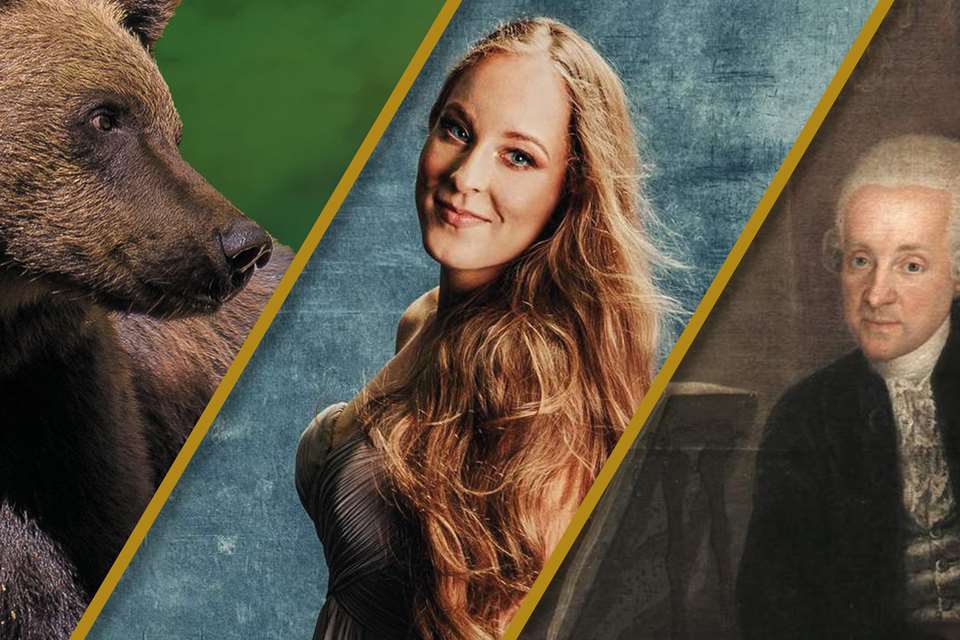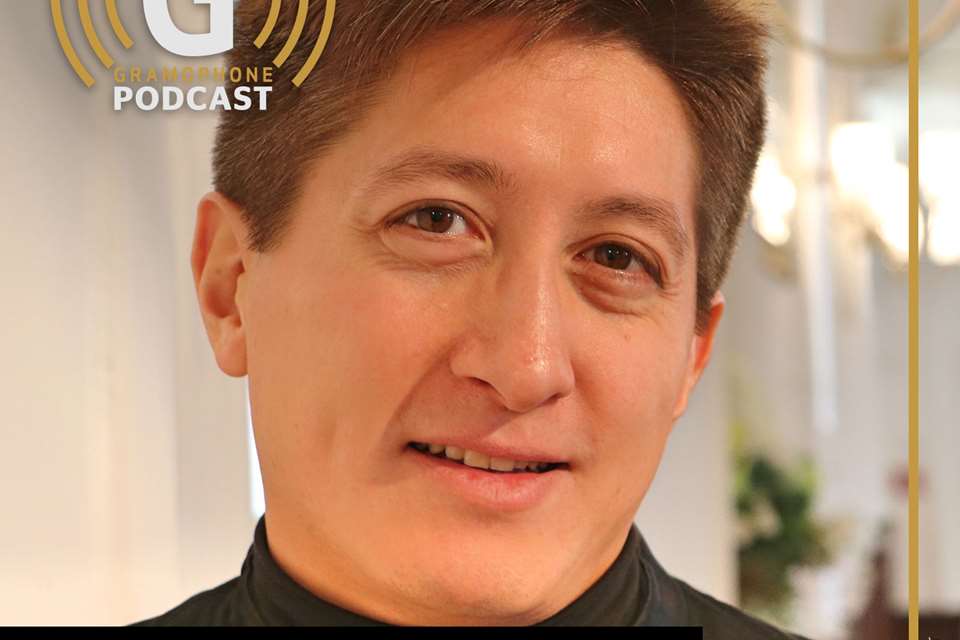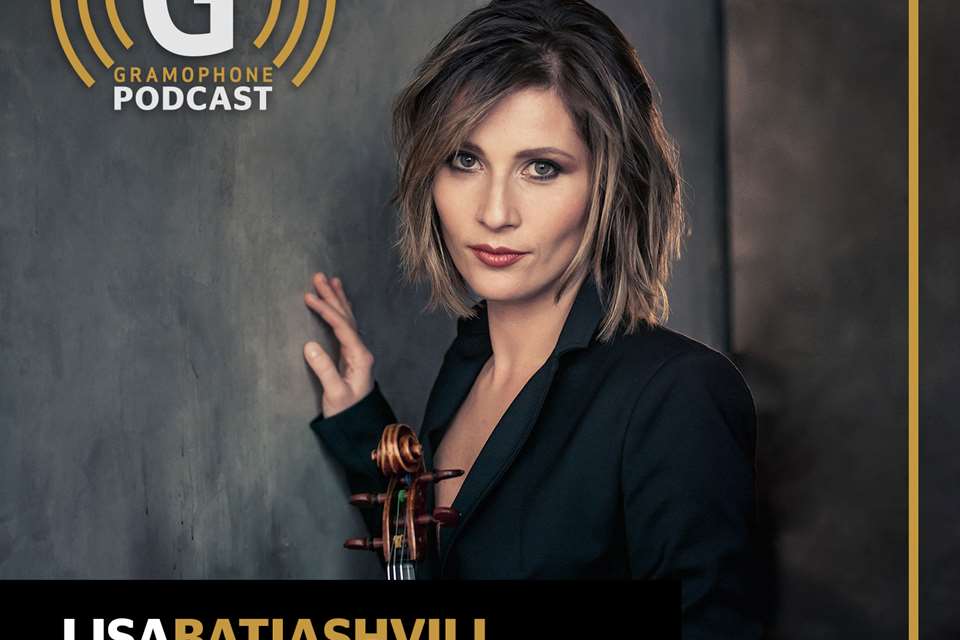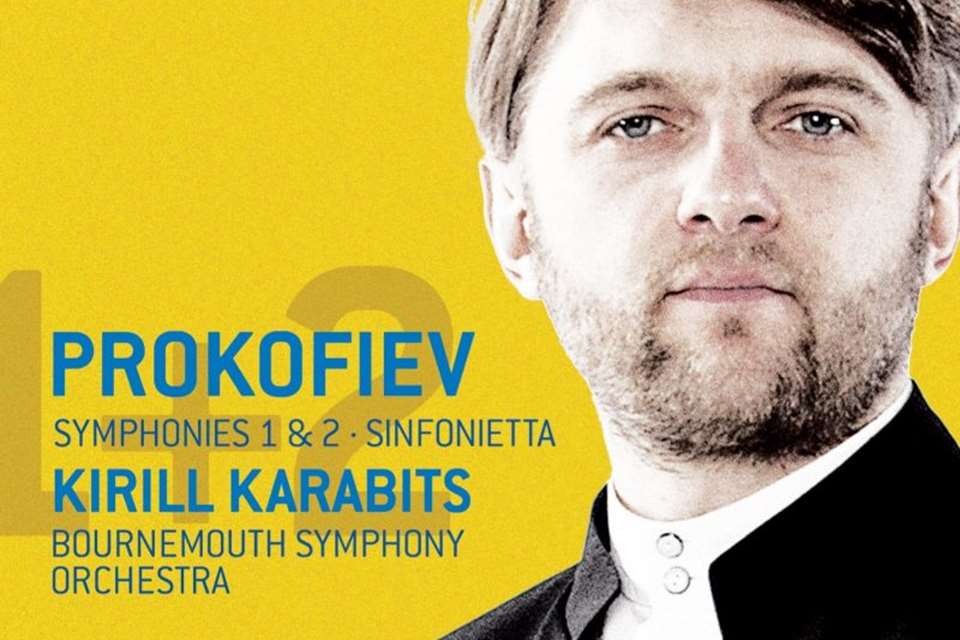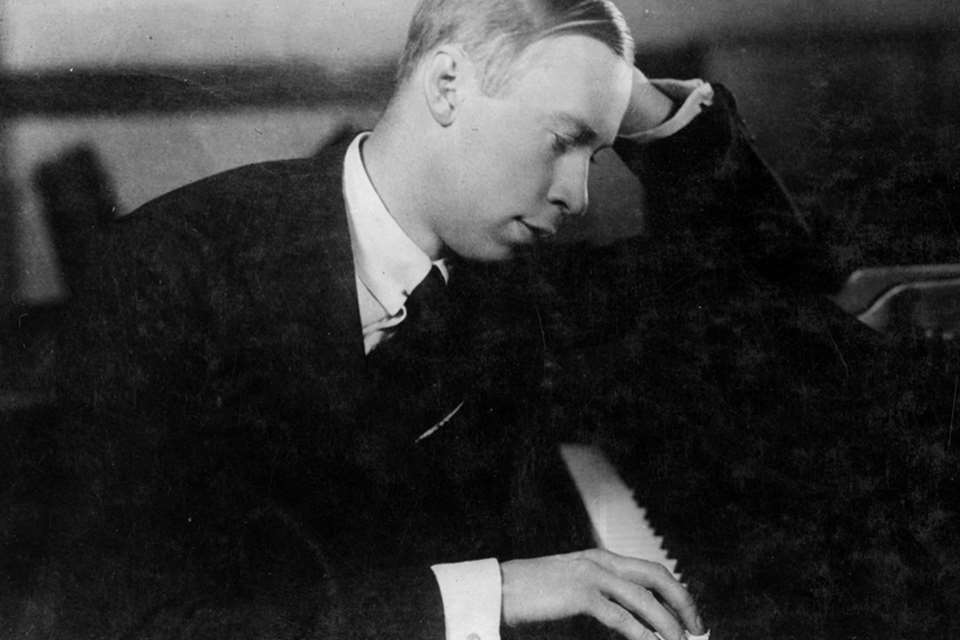Prokofiev's Peter and the Wolf | A Complete Guide To The Best Recordings
Jeremy Nicholas
Tuesday, May 25, 2021
Peter and the Wolf is a work of considerable charm for people of all ages. Jeremy Nicholas enters the menagerie of recordings on offer
Welcome to Gramophone ...
We have been writing about classical music for our dedicated and knowledgeable readers since 1923 and we would love you to join them.
Subscribing to Gramophone is easy, you can choose how you want to enjoy each new issue (our beautifully produced printed magazine or the digital edition, or both) and also whether you would like access to our complete digital archive (stretching back to our very first issue in April 1923) and unparalleled Reviews Database, covering 50,000 albums and written by leading experts in their field.
To find the perfect subscription for you, simply visit: gramophone.co.uk/subscribe
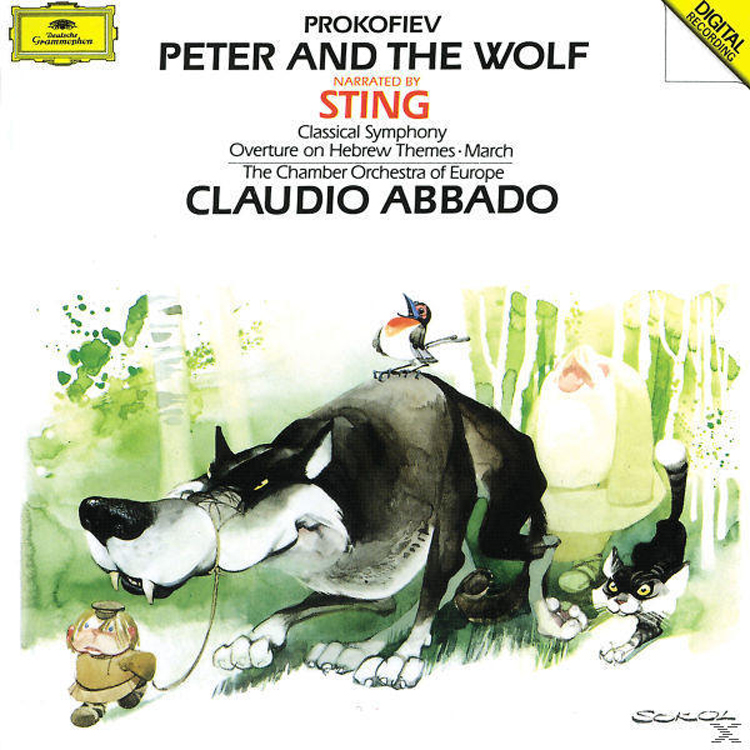
I was about 12 years old when a chiropodist friend of my parents, seeing how much I enjoyed classical music, gave me his entire collection of 78s. Included among the Toscaninis, Cortots, Galli-Curcis and Kreislers was HMV C4046‑8: Wilfred Pickles narrating Peter and the Wolf with the Philharmonia under Igor Markevitch. It was my introduction to the piece. Pickles (1904‑78) was the presenter of a then immensely popular radio quiz show, Have a Go!, and was obvious casting for the role of narrator: a celebrity who was friends with the microphone. It’s currently available as a download. The 1951 Record Guide, in praising Pickles’s narration, noted that the chief theme of the piece (Peter/violins) ‘appeared to be an anagram of the ‘Lambeth Walk’’, and was of the opinion that ‘though amusing enough at first hearing, Peter and the Wolf palls, once the element of surprise has been eliminated’. It is a comment of which I was frequently reminded when preparing this survey of recordings.
The story of the work’s genesis is well known. In June 1935, Prokofiev and his family were taken to the Moscow Children’s Theatre, then under the direction of Natalia Satz. A new Children’s Theatre was to be opened the following February and Satz had the idea of opening the building with a work that would familiarise children with the instruments of the orchestra. Prokofiev, while working on Romeo and Juliet, had composed some simple piano pieces for children (Music for Children, Op 65), which had prompted the notion of writing ‘a symphonic fairy-tale’. So when Satz approached him she found him not only amenable to the commission but ready with ideas for a storyline. ‘We came to the conclusion,’ Satz recalled, ‘that we had to find characters that could easily be associated with the concrete sound of different musical instruments.’ Prokofiev agreed: ‘Sharply contrasting characters must have correspondingly contrasting sound-colours, and every role must have its leitmotif.’
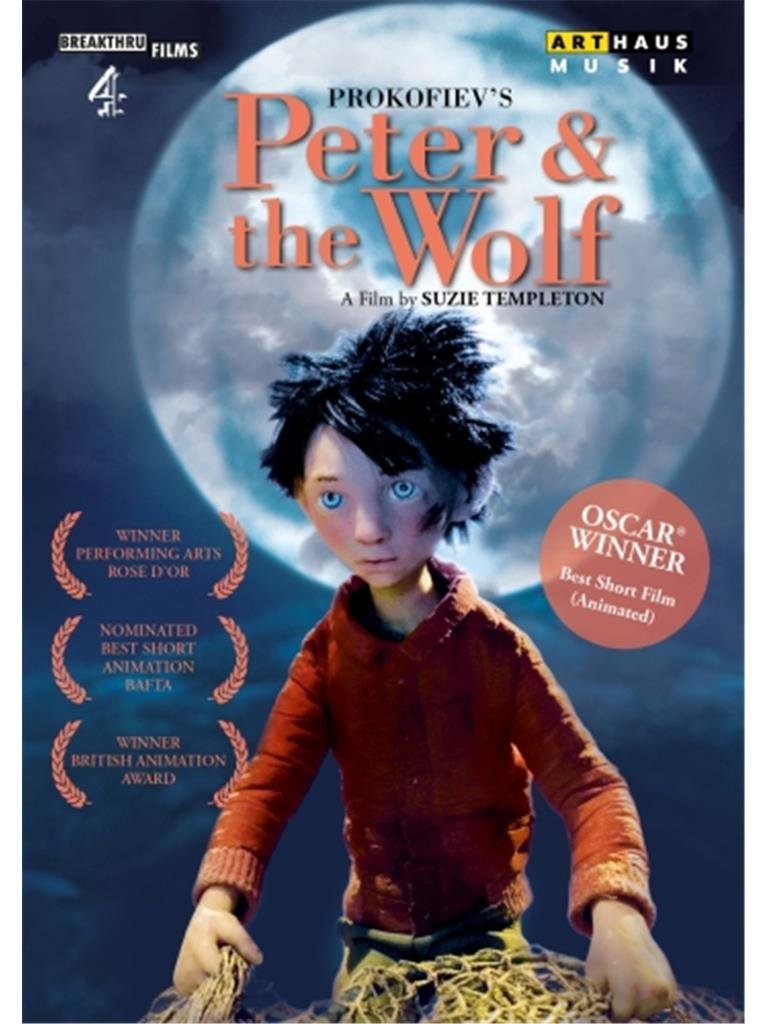
A rough draft of the text was given to a lyricist acquaintance of Natalia Satz who wrote a scenario in rhyming couplets with the title How Peter Outwitted the Wolf. Prokofiev vetoed the verse, feeling that it would detract from the music, and set about writing the text himself. For those who don’t know the story – I wonder how many reading this piece do not – the polyglot Nicolas Slonimsky has provided a succinct summary: ‘Peter is a Soviet boy who takes care of his pet animals, including a bird, a duck, and a cat. When a wolf invades his domestic zoo, Peter organises a hunt, rounds up the predator and takes him to the zoo.’ It took Prokofiev barely more than a fortnight to compose and orchestrate the music. Peter and the Wolf was given its first performance on the stage of the Central Children’s Theatre on May 2, 1936. It was conducted and narrated by Satz herself.
Among the earliest recordings were several from America: the first – probably the world- premiere recording – was made in 1939 for RCA Victor by Serge Koussevitzky and his Boston Symphony Orchestra with the Western character actor Richard Hale as narrator; soon after, Milton Cross, the long-serving ‘Voice of the Met’, and pianist Mario Janero recorded it on four 10-inch discs for the Musicraft label. In 1946 Disney released an animated Peter and the Wolf as a segment ofMake Mine Music, a kind of pops‘n’classics sequel to Fantasia. It was narrated by Sterling Holloway, a stalwart of many Disney cartoons. The soundtrack was released on disc, and the film later included in the reissue of Fantasia in 1947. Leopold Stokowski was not the conductor on that occasion, as he had been for the original Fantasia in 1940, but had already recorded the work in 1941 with Basil Rathbone and the All-American Orchestra. Stokowski’s soloists vividly characterise their parts, tempi are brisk, while Rathbone, the definitive Sherlock Holmes of his day, injects pace and drama into the text.
Ah, the text. Great literature it ain’t. Like many another composer who has tried his hand at the written word, Prokofiev was no prose poet. It doesn’t help that the inflexible, stodgy English texts accompanying the various published scores are translations by linguists who fail utterly to differentiate between prose to be read in the head and prose to be read out loud. That is why almost every narrator brings his or her personal variation to the printed text in an effort to make it more colloquial and breathe life into it. More of that later.
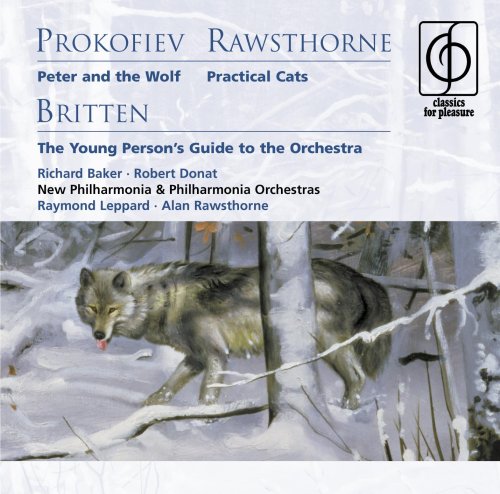
An American recording does not guarantee an American-accented narrator. South African-born Rathbone spoke with a refined English accent, as did the fruitier-toned Australian-born Cyril Ritchard (1897-1977) who recorded the work in the Broadwood Hotel, Philadelphia, with that city’s orchestra under Eugene Ormandyin 1957. Ritchard uses the microphone intimately (a lovely reading) while the orchestra is set behind him in a spacious acoustic. Conversely, Eleanor Roosevelt declaims the text as if she were addressing the Daughters of the American Revolution, while Koussevitzky in this second recording (1950) with his Boston players is heard in the attractive intimacy of the chamber-like Tanglewood Concert Hall. The disc, with its coupling of Sibelius’s Symphony No 2, is likely to appeal more to Koussevitzky fans than children. Two opera singers are among those with a greater feeling for words and atmosphere. Eric Shilling, the eminent bass-baritone who died in 2006, may not be a big-star name but his musical voice and exemplary enunciation are perfectly matched by Karel Ančerl and the Czech Philharmonic Orchestra (notably juicy woodwind and characterful brass). Sadly, he omits the introductory section, but the vigorous pacing of the music, the matching acoustic for narrator and orchestra, and the sense of a proper, integrated performance make this a leading contender.
Picture a cuddly, rosy-cheeked grandmother surrounded by eager young faces as she reads them a bedtime story. That is the image conjured up by Canadian contralto Margaret Forrester. As the mother of five children with several grandchildren, she had clearly had plenty of practice as a story-teller. Her vivacious, warm-hearted recording dates from 1991. The Montreal Metropolitan Orchestra and conductor Agnès Grossmann are fine (no more than that) but the two-disc set also has Forrester in her soft Canadian accent narrating Prokofiev’s Summer Day and Winter Bonfire (including sound effects), a booklet with the full texts, and Symphony No 7.
A third and different sort of singer provides another approach. Sting may not have the most melodious speaking voice nor be unduly concerned about enunciation (and his Grandfather characterisation is terrible) but he brings, like few others, a real sense of adventure to proceedings. Claudio Abbado and the Chamber Orchestra of Europe win first prize for the timpani/gunshots and combine high spirits with light-heartedness while lingering for moments of touching pathos (try the passage after the Duck’s demise). The clarinettist, by the way, is one of only a handful on disc who really sends the Cat scampering up the tree (accelerandoand precipitato as Prokofiev demands) to escape the Wolf.
Lenny Henry’s narration (under Jacques Pési) has the same contemporary touch as Sting’s. Children will immediately respond to his enthusiasm, charm and palpable sincerity. Unfortunately, instead of a flute for the Bird we have a Chinese sheng, and a tiple for the Duck (great in a Catalan cobla band but not here). Devastatingly, there’s an oboe d’amore for the Cat instead of a clarinet and, ludicrously, three accordions for the Wolf instead of French horns.
André Previn’s narration is, by contrast, so laid-back that it borders on the dismissive. Intoned in a colourless voice, he appears to be speaking in a catacomb – a pity, because he leads one of the best-engineered and most responsive recordings. The RPO’s strings are suave and playful, the brass and percussion are given their head and small details, like the three unearthly bars of harmonics played (doloroso) by the cellos after the Wolf has swallowed the Duck or the castanets in the final march, are lucidly captured.
Another conductor/narrator offers a more generalised view of the score but a more practised and thoughtful narration. Leonard Bernstein recorded in 1960 (and, like Ormandy, in a hotel – St George, Brooklyn) is the only narrator who introduces himself – ‘This is Leonard Bernstein’ – and begins not by telling his audience what the instruments represent but by asking them to guess. ‘Right again…My, you really know this piece, don’t you?’. With his mellifluous speaking voice, Bernstein’s brief additions to the text add clarity.
Three generations of Prokofievs have recorded the work: Lina Prokofiev, the composer’s widow, was the first, in 1986, and a remarkably feisty and engaging reading she gives too, with a voice that belies a lady then in her 89th year (she died in London aged 91 in 1989). Well recorded, Neeme Järvi is a routine rather than inspired partner. In 1991 Lina’s son Oleg Prokofiev (1928‑98) and his 16-year-old son Gabriel shared the narration. Oleg (with his accented English) and Gabriel (RP English) are charming amateurs, overshadowed by the vibrant playing of the New London Orchestra under Ronald Corp. However, the disc includes The Ugly Duckling narrated by soprano Penelope Walmsley-Clark, Winter Bonfire and Summer Day, full texts and Natalia Satz’s account of the work’s genesis taken from her autobiography.
For Finnish speakers, Lasse Pöysti is the accomplished kertoja with Jukka-Pekka Saraste on the Ondine label. French speakers can turn to Jacques Martin as récitant, Germans to Marius Müller-Westernhagen as Sprecher and Spaniards to Miguel Bosé as recitador. All three have the same backing from Kent Nagano and the Lyon Opéra Orchestra and are available in the same impressive six-CD set from Warner Classics of Prokofiev’s stage works and film scores. The English version is narrated by Patrick Stewart, aka Captain Jean-Luc Picard of the Starship Enterprise. Stewart and Nagano are polished, accurate, sound beautiful and are quite uninvolving.
Nagano does a better job with the Russian National Orchestra. Sophia Loren is an accomplished and sympathetic narrator. Unhappily, the rest of the short (47'50") disc is taken up with Mikhail Gorbachev mouthing mercifully brief platitudes in Russian, and Bill Clinton narrating a monumentally nauseous and politically correct version of the tale to the accompaniment of some elevator music. The upside is that all the narrators’ royalties go to charity.
Hermione Gingold’s eccentrically ripe rendering is a delight (our own Edward Greenfield’s improved version of the traditional text is far more narrator-friendly) but sometimes strays off-mike. Her unlikely partners are Karl Böhm and the Vienna Philharmonic who provide the best Wolf’s entrance of all, the cymbals and brass creating a truly menacing atmosphere. DG pairs this with Carnival of the Animals interspersed with Ogden Nash’s anachronistic verses.
Richard Baker, the broadcaster and music buff, had one of the great microphone voices of recent times. His narration, ideally balanced against the orchestra, bears repeated listening. Raymond Leppard and the New Philharmonia don’t miss a trick. The coupling is The Young Person’s Guide, with Eric Crozier’s dry-as-dust introductory text actually made to sound interesting by Baker, and Robert Donat’s recording of Rawsthorne’s Practical Cats conducted by the composer (if Peter andBabar are fairly easy to perform live and Façade is challenging, believe me, Practical Cats is the killer of all narrator-and-orchestra works.)
My own version of Peter (which I won’t attempt to review!) was added to an early Naxos CD with the Czecho-Slovak Radio Symphony Orchestra under Ondrej Lenárd. That was issued initially without narration, an oddity you can still track down (the only other CD recording I’ve found without narration is Tatiana Nikolaieva playing her piano transcription). My take on it survived in the catalogue until it was superseded by Dame Edna Everage in 1997. Her ‘possumised’ version has sold by the truckload but, for me, an Australian housewife telling the story is funny only on the first hearing. Nor is the playing of the Melbourne SO under John Lanchbery anywhere near outstanding.
Sean Connery’s contribution (1965) was also recorded in a separate location to that of his partners, the Royal Philharmonic under Antal Dorati. He had just four hours free to read Gabrielle Hilton’s revised narrative in a suite at the London Hilton before dashing off to Greece to be 007 again in Thunderball and donating his royalties to Dr Barnardo’s. Connery’s velvet voice is all right but too consistently sotto voce, lacking variety in tone, pace and characterisation. Christopher Lee (Scaramanga to Roger Moore’s 007) uses his rich bass-baritone to chilling effect in a masterly and musical reading aided by Yehudi Menuhin’s lively handling of the score. Lee, though, is placed rather too backwardly against the orchestra, and the couplings (Prokofiev’s Classical Symphony and Violin Concerto No 1) are not ideal first choices for young children. Alec McCowen does all the voices – and does them very well (a particularly fine Duck) – but I question some of the changes to the text, such as inserting a final plea from the Duck (‘Let me out, let me out of here’). His conductor, Bernard Haitink, who shares the role with others on a twofer of favourite Prokofiev suites, is not alone in departing from some of Prokofiev’s tempo markings, to no bad effect (eg the Hunters’ entrance, faster than crotchet=116).
John Gielgud, in the first of two recordings, proves more warmly engaging than either Lee or McCowen, speaking the traditional text with that extraordinary and (to my ears) beautiful voice – though what young children today will make of his fluting tones I have no idea. Virgin Classics’ booklet, though, is a disgrace.
If Wilfred Pickles was my first Peter, my benchmark version for years was the recording by Gielgud’s close friend Ralph Richardson with the LSO and Malcolm Sargent. Recorded in 1959, it still sounds amazingly well for its age but the performance now seems formal and old-fashioned. The LSO soloists are not encouraged to enjoy themselves and, though Sir Ralph is an avuncular story-teller, he is clearly a relative in front of whom it would be wise not to misbehave. However, Decca’s twofer in which it appears in its latest incarnation is the most complete collection of classics for kids on the market.
The CD survey ends as it began with a great radio personality. Recorded back in 1985 with the Boston Pops and John Williams, Terry Wogan has one of the best microphone techniques in the business, and his mischievous, tongue-in-cheek delivery of the text adapted to his own persona is freshly minted, his tone perfectly calculated to win over today’s generation of youngsters (the American release of the disc featured Dudley Moore as narrator).
Radio, as we know, has all the best pictures but three DVDs of Peter offer different and enchanting visual realisations of Prokofiev’s vision, even if his original purpose becomes a secondary consideration. Matthew Hart’s choreography for the Royal Ballet School in 1997 with Ian Spurling’s stunning design is as stylish as it is witty (the Hunters are a hoot), neatly danced by the youngsters and watched over by no less than Anthony Dowell as story-teller and Grandfather. The Abbado/Sting Peter is given an original and quirky visual realisation courtesy of Roger Law and his Spitting Image puppets. It’s clever, delightfully dotty (if a little knowing and offering no exercise for a young imagination), but kids of my acquaintance sit entranced and wide-eyed.
Then there is Suzie Templeton’s Oscar-winning animated film from 2006, already a classic of its kind. There is no narrator – none is needed – for the updated story unfolds with logic and comedic balletic precision in, arguably, the only attempt to bring some psychological realism to Prokofiev’s sketchy tale. Apologies to David Bowie, Alec Clunes, Jacqueline du Pré, George Raft, Johnny Morris, Beatrice Lillie, Angela Rippon, Willie Rushton, Boris Karloff, Peter Ustinov, Frankie Howerd, Mia Farrow, Ben Kingsley, Oda Slobodskaya, Eric Porter and Michael Flanders, but I’ve heard enough. From a short list of Richard Baker, Hermione Gingold, Terry Wogan and Sting, my young friends Sam (10) and Jessie (9) unhesitatingly chose Sting with Abbado. But if you prefer the Urtext spoken by a master narrator with a perfectly modulated voice, it has to be Richard Baker with Raymond Leppard’s detailed, affectionate and robust musical illustrations.
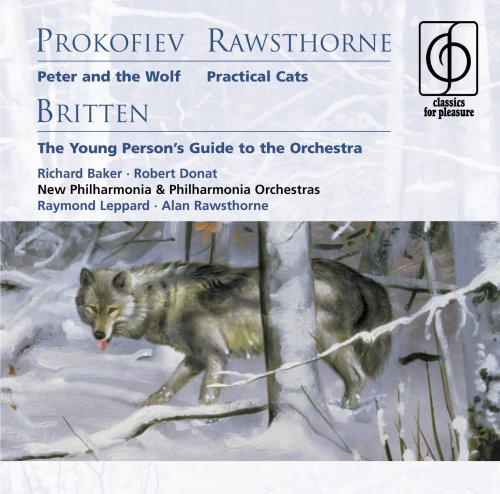
The Top Choice
Baker; New Philh Orch / Leppard
It’s a real pleasure to listen to a speaker who treats the microphone as an intimate friend and the traditional text with respect, managing to do so without drawing undue attention to himself. Baker’s narration, ideally balanced against the orchestra, bears repeated listening.
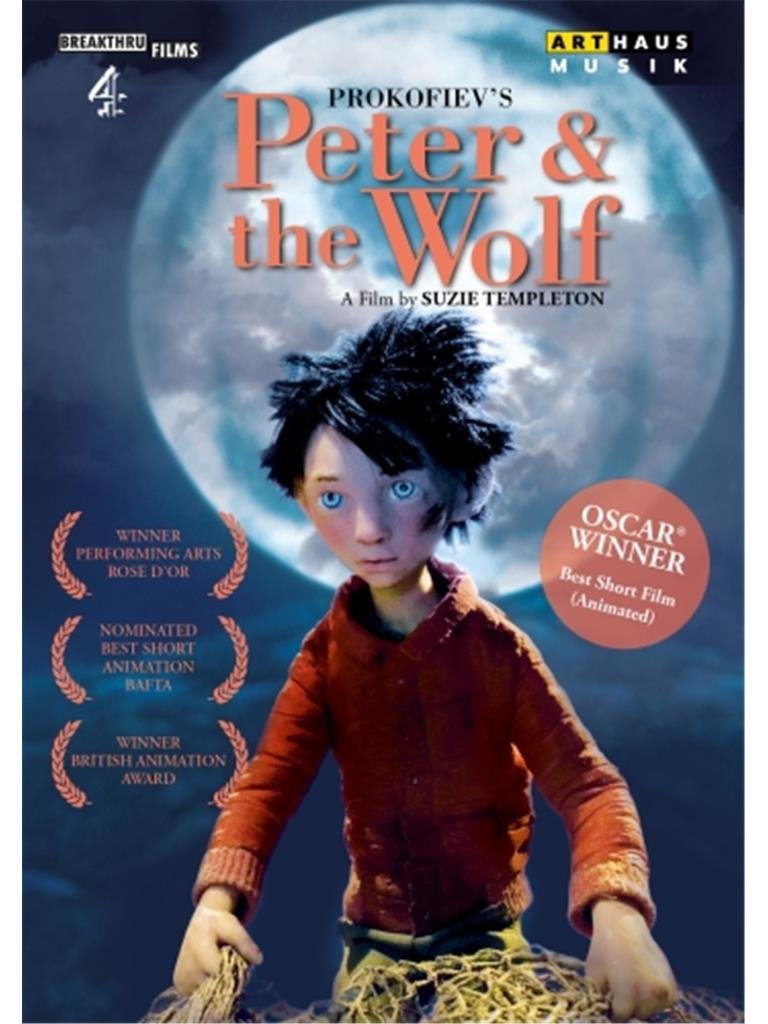
DVD Choice
Philh Orch / Stephenson (dir Suzie Templeton)
The score remains intact but the storyline is given a facelift with a grim contemporary opening sequence and some genuinely funny animal antics that make this a captivating experience for children. The film won the 2008 Academy Award for Best Short Animated Film.
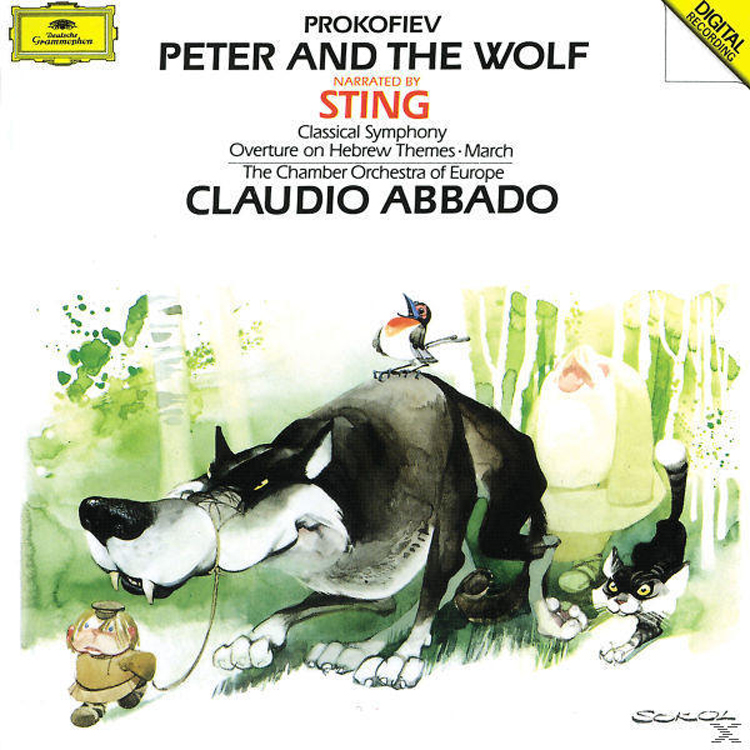
The Updated Choice
Sting; COE / Abbado
Sting’s involvement is infectious – one really gets the sense of a dad performing for his kids in his modernised, colloquial reading. Claudio Abbado and the Chamber Orchestra of Europe give arguably the best overall account of the score on disc.
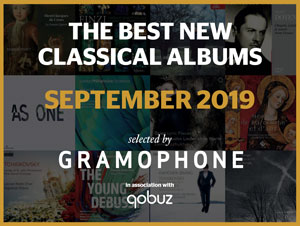
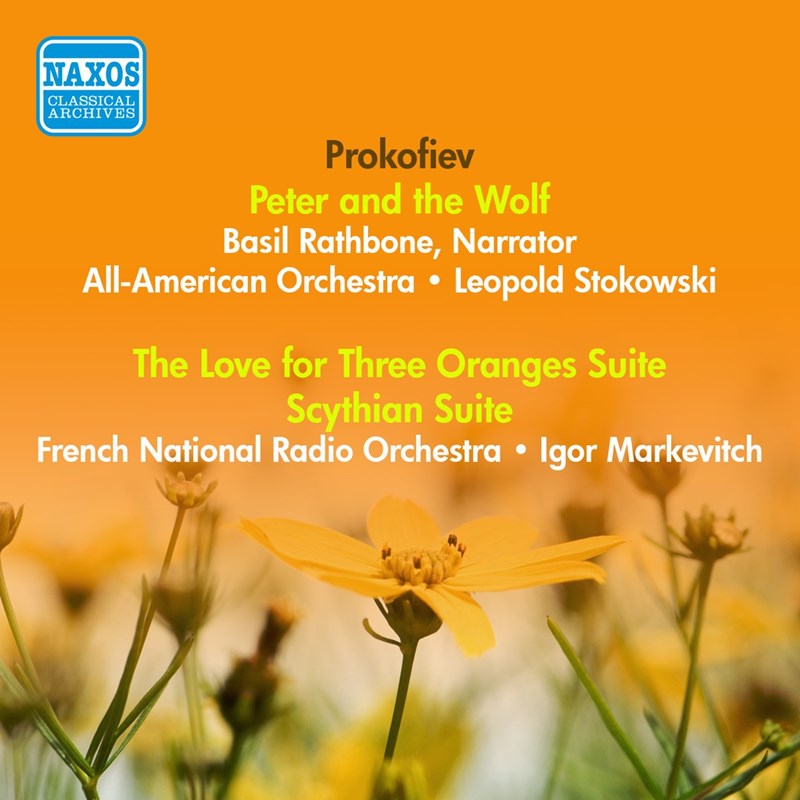
The Historical Choice
Rathbone; All-American Orch / Stokowski
The sound resembles a Tom and Jerry cartoon but, remarkably, this works in the music’s favour. It’s hugely enjoyable, coupled with (narrator-less) performances of Carnival of the Animals (Stokowski), Young Person’s Guide (Sargent) and Jeux d’enfants (Dorati).
Selected discography
Date / ArtistsRecord company (review date)
1939 Hale; Boston SO / Koussevitzky / Pearl GEMMCD9487 (2/40R)
1941 Rathbone; All-American Orch / Stokowski / Avid AMSC601 (11/98)
1950 Roosevelt; Boston SO / Koussevitzky / Naxos 8 111290
1954 Baker; New Philh Orch / Leppard / CfP 382230-2
1957 Ritchard; Philadelphia Orch / Ormandy / Sony SBK62638 (11/60R)
1959 Richardson; LSO / Sargent / Decca 458 595-2DF2 (1/92R)
1960 Bernstein; NYPO / Sony SMK60175
1963 Shilling; Czech PO / Ančerl / Supraphon SU3676-2
1965 Connery; RPO / Dorati / London 444 104-2LPF
1969 McCowen; Concertgebouw Orch / Haitink / Philips 442 278-2PM2
1974/75 Gingold; VPO / Böhm / DG 415 351-2GH
1985 Wogan; Boston Pops Orch / Williams / Philips 412 559-2PH
1986 Sting; COE / Abbado / DG 429 396-2GH (4/91); 073 4267GH
1986 L Prokofiev; SNO / N Järvi / Chandos CHAN8511 (5/87); CHAN10484; CHAN2022 (10/06)
1986 Previn; RPO / Telarc CD80126 (5/87)
1988 Gielgud; Acad of London / Stamp / Virgin 562497-2 (9/89R)
1989 Nicholas; Czecho-Slovak Rad SO / Lenárd / Naxos 8 550335; 8 550499
1989 Lee; English Stg Orch / Menuhin / Nimbus NI5192
1991 O & G Prokofiev; New London Orch / Corp / Hyperion CDH55177
1991 Forrester; Montreal Metropolitan Orch / Grossmann / CBC SMCD5118-2
1992 Pöysti; Helsinki Rad SO / Saraste / Ondine ODE793-2
1993 Stewart/Martin/Müller-Westernhagen/Bosé; Lyon Opéra Orch / Nagano / Warner B0927 49636-2
1997 Everage; Melbourne SO / Lanchbery / Naxos 8 554170
1997 Dowell; Royal Op Orch / Murphy (Royal Ballet School) / ArtHaus 100 102
1999 Henry; ens / Pési / Virgin 561782-2 (5/00)
2002 Loren; Russian Nat Orch / Nagano / Pentatone PTC5186 011 (2/04)
2006 Philh Orch / Stephenson (dir Templeton) / ArtHaus 101 804GB
This article originally appeared in the March 2011 issue of Gramophone.




